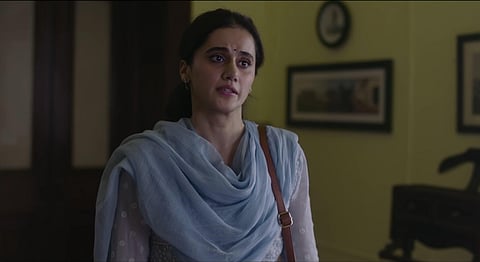

Films need to run disclaimers on screen for smoking, consuming alcohol and even scenes with animals -- but not for domestic violence. After all, slaps are not a big deal. Or are they?
The Thappad filmmakers have released a minute and 47 seconds-long video underscoring why even a single slap is not okay and appealed to viewers to sign a petition to Prasoon Joshi, the chairperson of the Central Board of Film Certification, for disclaimers while showing domestic violence.
WATCH
In the film, actor Taapsee Pannu rams home one point: 'Thappad bas itni si baat nahi hei'.
Just a slap?
No, it's not. It's domestic violence.
As someone who has witnessed domestic violence first hand, I believe this disclaimer will push people to think and talk about it, regardless of whether impatient, pop-corn crunching moviegoers care for it or not.
Dr Hema Tharoor, a senior psychiatrist in Chennai, said, "Just one slap, isn't it? That notion is wrong because it mostly never stops there. But even one hit is unpardonable."
Narrative must change
Movies depict the hero slapping his partner out of anger and frustration. The slap is also portrayed as an expression of love which leads youngsters to think that if you love someone, it's okay to slap - as seen in recent hits like Kabir Singh.
"Culturally, in a patriarchal society a slap is accepted, it is normal. The person who slaps feels justified that it was the right thing to do," said Dr Tharoor.
"A slap signifies suppression, oppression, solution or expression to some but it also marks the beginning of aggression and violence in a relationship," she said.
Dr Tharoor sees movies like Thappad as the beginning of a discussion on how much we tolerate, protest or accept such aggression when we see it.
When asked what stops physical abuse from being reported, she cites upbringing, culture, societal pressures and lack of 'immediate action', like you would get for a 911 call in the US, as possible reasons. But even there, it goes unreported because spouses are afraid of losing their visa status.
"Unless there is a major life-threatening deterrent, intimate partner violence continues," she added.
Dr Tharoor explains that violent behaviour from a person's childhood seeps into their lives as adults. Children who see their parents fighting grow up to exhibit the same behaviour. And so the cycle repeats.
Conversation in Kerala
Kerala, India's most educated state, has been at the forefront when it comes to calling out misogyny. Actor, activist and psychologist Parvathy T said, "Malayalam films are ahead of their times and I am happy producers are backing such films - like Uyare (which features an acid attack victim) for example."
Is the audience ready for such progressive movies?
The veteran actor said, "We should continue showing them. Nobody is ready for anything."
When Kumbalangi Nights was released, she said, "Some people asked me what was wrong with Shammi. They said, 'Why chechi? Why is this person a villain? He ought to take care of his wife. He was protecting his wife and family. What's wrong with that?' So I explained it to them after which they liked the movie."
That's the point. She added that when a movie creates such a narrative, change will come. "So many things are usually brushed under the carpet. This (domestic violence) is not something that should be brushed aside. It should be discussed."
The Kerala film industry that glorified and normalised domestic violence for years finally underwent a serious transformation in recent years.
Well ahead of its peers, it started displaying the warning 'Violence against women is punishable under the law' a year ago.
Just one slap?
The actor agrees hands down that 'just one slap' can be categorised as domestic violence: "Yeah, it cannot happen. Whatever said and done, it's violence."
She noted that we are taught to slap people to correct them -- it all starts in childhood.
"We take our children for granted, some mothers beat them, thinking they have the right to do so just because 'I delivered this child'. These things will bite back," she said on the cycle of violent behaviour.
Taapsee breaks the ceiling
Tapsee's characters over the years as Amrita (Thappad), Minal (Pink) and Shabaana (Naam Shabaana) have broken gender stereotypes.
"Even though people are facing a backlash for making movies that break barriers, they continue. Women are coming to the forefront," said Parvathy.
On actors breaking barriers, she said, "Although some don't approve, they are looking at such movies and saying 'Look, wow, they are actually doing this'. That conversation is happening."